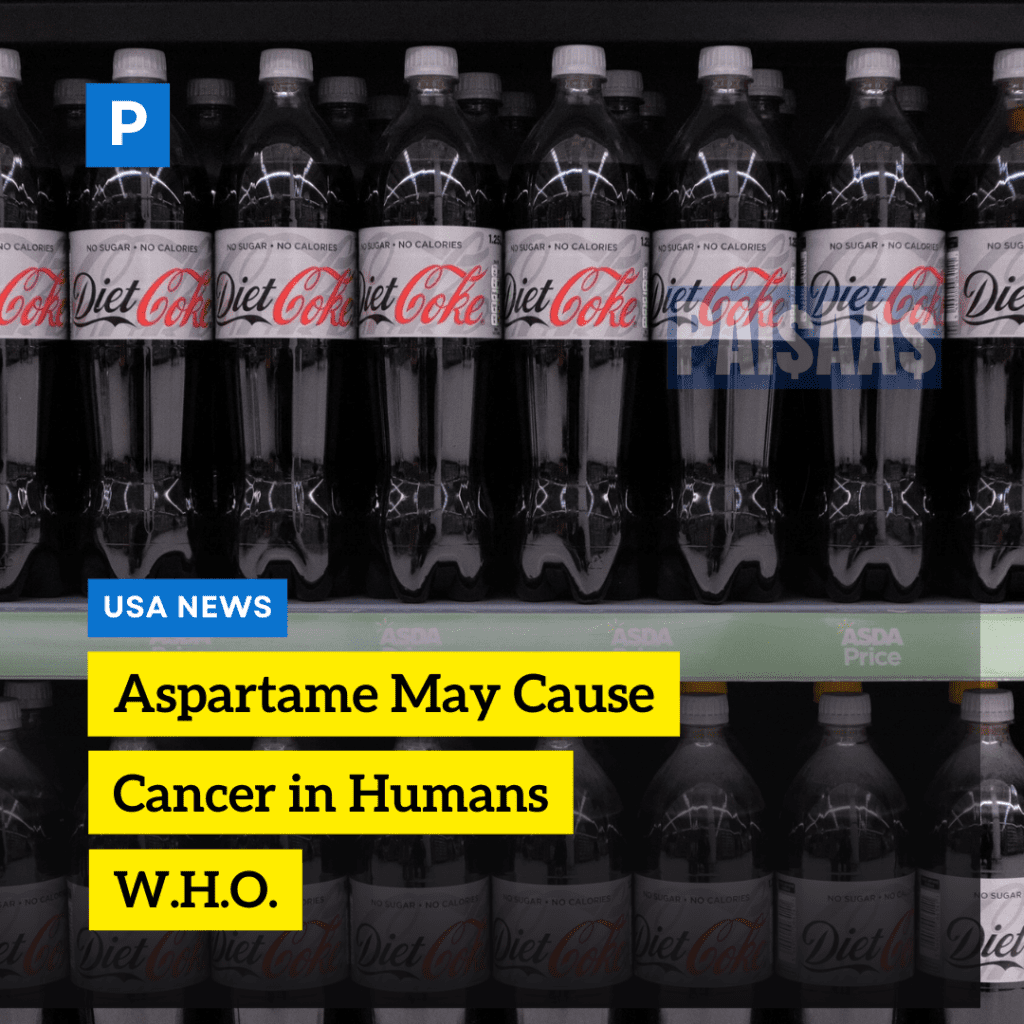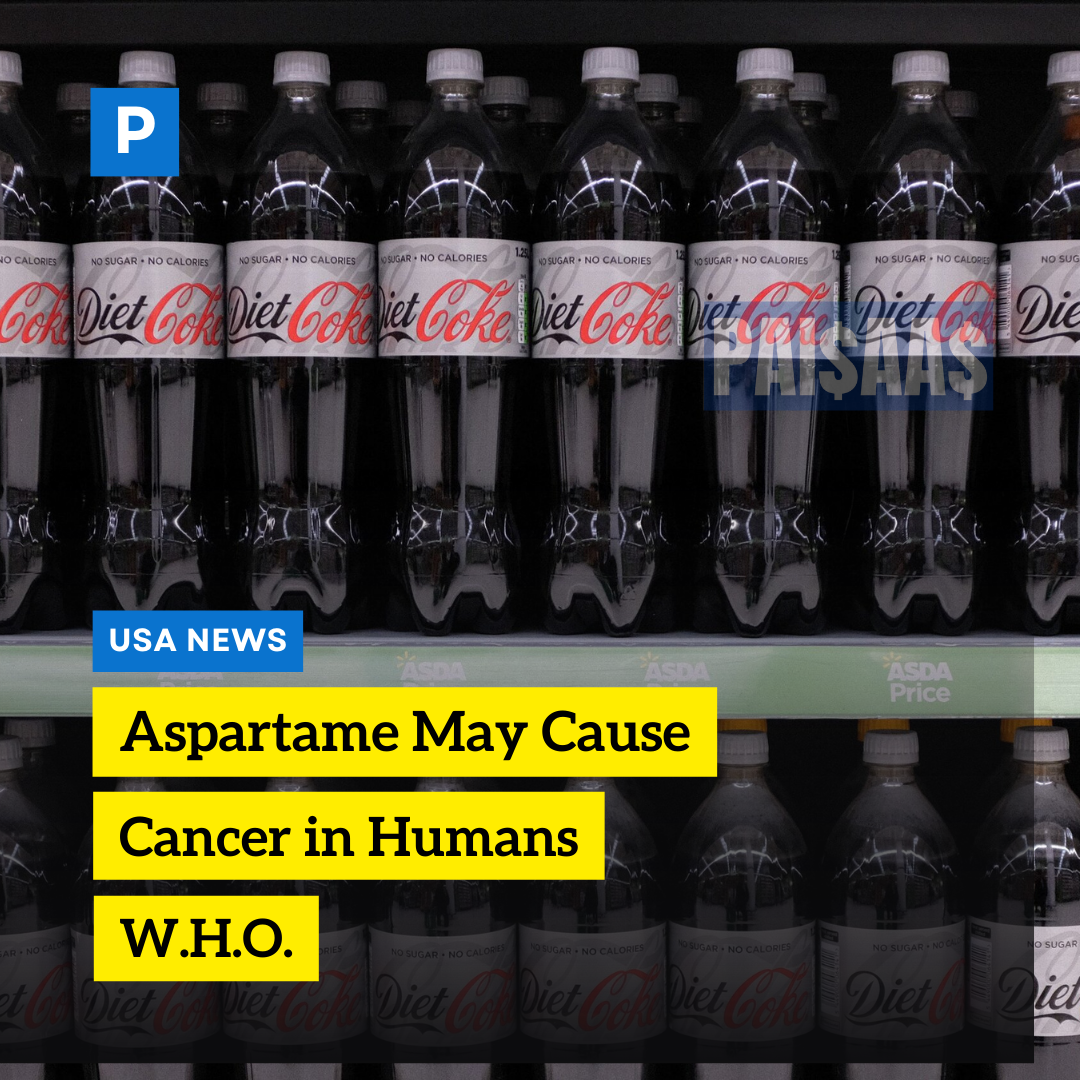

Aspartame May Cause Cancer in Humans, W.H.O.
Aspartame May Cause Cancer in Humans, W.H.O.
Aspartame is an artificial sweetener that is extensively used in diet beverages and foods that are low in sugar. On Thursday, an organisation inside the World Health Organisation announced that there is a possibility that aspartame could cause cancer.
A second W.H.O. committee, on the other hand, did not change its opinion on the amount of aspartame that can be consumed safely. According to some estimates based on the criterion established by the panel, a person who weighs 150 pounds may theoretically escape the risk of developing cancer while still consuming almost a dozen cans of diet soda on a daily basis.
This is the first time that a large international entity has publicly weighed in on the consequences of the practically ubiquitous artificial sweetener, and the announcement that there is a cancer risk associated with aspartame was made by an agency of the World Health Organisation (WHO). Since its introduction, aspartame has been the subject of heated debate.
The International Agency for Research on Cancer, or I.A.R.C., said it based its conclusion that aspartame was a possible carcinogen on limited evidence from three observational studies of humans. These studies, according to the I.A.R.C., linked the consumption of artificially sweetened beverages to an increase in cases of liver cancer — at levels that were far below consuming a dozen cans per day. It noted that the results could potentially be skewed towards the profile of those who drink higher volumes of diet drinks and asked for further research, noting that this is a possibility.
According to Dr. Francesco Branca, director of the World Health Organization’s Department of Nutrition and Food Safety, those who use excessive doses of aspartame should seriously consider switching to water or other beverages that do not include any added sweeteners.
In spite of this, he continued by saying, “Our results do not indicate that occasional consumption should pose a risk to most.”
An explosion of no-sugar and low-sugar food and beverage options has emerged in response to growing concerns about rising incidence of diabetes and obesity around the world, as well as shifting preferences among consumers. Aspartame is one of six sweeteners that have been approved for use in the United States. It can be found in thousands of goods, including sugar-free gum, diet sodas, teas, energy drinks, and even yoghurts. Equal packets contain aspartame. Additionally, it is utilised in the pharmaceutical industry to sweeten a variety of goods.
On Thursday, the Food and Drug Administration of the United States released an uncommon critique of the conclusions of the worldwide body and restated its position that aspartame is safe, which it has maintained for a long time. The FDA approved aspartame more than three decades ago. The Food and Drug Administration issued a statement in which it said it “disagrees with the I.A.R.C.’s conclusion that these studies support classifying aspartame as a possible carcinogen to humans.”
The Food and Drug Administration also stated that “aspartame being labelled by the W.H.O. as ‘possibly carcinogenic to humans’ does not mean that aspartame is actually linked to cancer.” The Food and Drug Administration did not make any of its consultants or other experts accessible for interviews to address the agency’s particular worries.
However, because it was directed at an international organisation, this volley was guaranteed to spark additional controversy in Europe (even if the sweetener is still considered to be safe there) and to reopen the investigation in the United States. In addition, the contradictory announcements made by global authorities are very likely to cause confusion among customers.
The World Health Organisation (WHO) has on occasion been found to be out of step with other authorities regarding potential cancer dangers, such as glyphosate; nevertheless, it later led the way in establishing that glyphosate was hazardous to the health of humans. The establishment by the international organisation of a connection between that chemical in Roundup, a weed killer, and the development of cancer served as the impetus for legal action against the manufacturers of the herbicide.
The influential beverage industry in every region of the world has waged a protracted and arduous campaign against any regulatory or scientific discovery that linked the consumption of artificial sweeteners to an increased risk of cancer or other health issues. Aspartame is merely the most recent front on which multinational corporations have engaged in a war of words against newly published scientific research or possible associations with increased health hazards.
“Aspartame is safe,” stated Kevin Keane, interim president of the American Beverage Association, in a statement. He emphasised the conflicting declarations made by the World Health Organisation, specifically calling attention to the second panel, the Joint Expert Committee on Food Additives, which carried out a contemporaneous study but maintained the same recommended daily intake amount. According to a summary provided by the WHO, it was also determined that the evidence for cancer in people was “not convincing.”
Mr. Keane stated that the World Health Organisation has concluded that aspartame is safe and that there is “no sufficient reason to change the previously established acceptable daily intake.” This conclusive evidence bolsters the position taken by the Food and Drug Administration (FDA) and food safety agencies from more than 90 nations.
Both Coca-Cola and PepsiCo did not respond to requests for comment, with the former directing inquiries to the American Beverage Association.
There has been a lot of concern raised about the safety of sugar substitutes, including a debate that has been going on in the scientific community for decades about the use of saccharin in the diet drink Tab. After saccharin was found to cause bladder cancer in rats, Congress ordered more research into the substance. Since then, the Food and Drug Administration has said that 30 research have shown that the results seen in rodents do not apply to humans. As a result, regulators in the United States have removed saccharin from a list of probable carcinogens. In more recent times, several sweeteners have been the subject of investigations into suspected links to adverse health effects.
Studies conducted on rodents between 2005 and 2010 by academics located in Italy that demonstrated a relationship to cancer are at the heart of the controversy over aspartame. The Food and Drug Administration has stated that the studies that have been disputed for a long time are “compromised.”
Dr. William Dahut, chief scientific officer of the American Cancer Society, which led one of the key studies the WHO relied on, said the findings should be considered alongside the WHO’s report from earlier this year that indicated artificial sweeteners offered no help in achieving weight loss or protection from other chronic conditions. The WHO report indicated that artificial sweeteners offered no help in achieving weight loss or protection from other chronic conditions.
He stated that there was currently insufficient evidence to suggest that drinking one can of Diet Coke every day would increase the risk of cancer, and he added that “more research is needed.” According to him, the scientific community has reached a consensus on the importance of avoiding cancer-causing substances such as tobacco, alcohol, processed meat, and excess body weight.
The International Agency for Research on Cancer stated that it was unable to rule out the possibility that the studies that linked aspartame to liver cancer were the product of chance or other factors that are related with drinking diet soda.
The cancer agency of the World Health Organisation classifies substances as carcinogenic, probably carcinogenic, potentially carcinogenic, or without classification. These values are more reflective of the quality of the scientific evidence than of the likelihood that the chemical would cause cancer.
Aspartame should be consumed at a daily level that is less than 40 milligrammes per kilogramme of a person’s weight, which is a level that is slightly lower than the one that is prescribed in the United States, which is 50 milligrammes.According to estimates provided by the Food and Drug Administration (FDA), a person weighing 132 pounds would have to eat 75 packets of aspartame sweetener before reaching the point where there is a possibility of being exposed to a risk.
In order to perform the assessment of existing studies, the International Agency for Research on Cancer (I.A.R.C.) gathered 25 cancer experts from 12 different countries in the city of Lyon, France. Based on the findings of three studies that linked artificially sweetened drinks to increases in hepatocellular carcinoma, which is the most frequent type of liver cancer, the researchers came to the conclusion that there was insufficient evidence for cancer in humans.
In one study published in 2016, World Health Organisation (WHO) experts looked at data from roughly 500,000 adults in Europe who had been monitored for approximately 11 years. The individuals’ use of juice and soft drinks was monitored with the purpose of determining any potential links to malignancies of the liver and bile ducts. An increased risk of liver cancer was shown to be connected with each additional serving of diet soft drink consumed on a weekly basis. The study looked at those who drank artificially sweetened soft drinks and found that it elevated the risk by 6%.
Researchers from Harvard, Boston University, and the National Cancer Institute in the United States conducted an investigation on the sweetened beverage consumption that individuals reported on questionnaires and cancer case registries. The study was published in the previous year. Researchers discovered that patients with diabetes who reported drinking two or more drinks with artificial sweeteners on a daily basis had an increased chance of developing liver cancer. According to the findings of that study, people who drank diet Coke but did not have diabetes did not have an increased risk of developing liver cancer.




